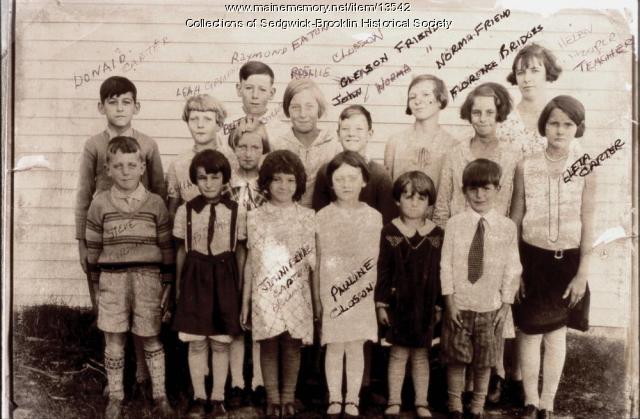Keywords: Schools children
Item 31347
Coal Kiln School, Scarborough, ca. 1900
Contributed by: Scarborough Historical Society & Museum Date: circa 1900 Location: Scarborough Media: Photographic print
Item 31382
Beech Hill School, Scarborough, ca. 1879
Contributed by: Scarborough Historical Society & Museum Date: circa 1879 Location: Scarborough Media: Photographic print
Exhibit
Reading, Writing and 'Rithmetic: Brooklin Schools
When Brooklin, located on the Blue Hill Peninsula, was incorporated in 1849, there were ten school districts and nine one-room school houses. As the years went by, population changes affected the location and number of schools in the area. State requirements began to determine ways that student's education would be handled. Regardless, education of the Brooklin students always remained a high priority for the town.
Exhibit
Public education has been a part of Maine since Euro-American settlement began to stabilize in the early eighteenth century. But not until the end of the nineteenth century was public education really compulsory in Maine.
Site Page
Guilford, Maine - Guilford Schools
"This school also served as a Town Hall and meeting place. The building was constructed of logs and featured an open fireplace that was said to be…"
Site Page
Historic Hallowell - Hallowell Schools
"Soon after, the children from Gardiner, Augusta, and other nearby towns came to learn at the Hallowell Academy. High School, Hallowell, ca."
Story
Classroom Time Capsule
by Anna Bennett
On March 12, 2020, I left my classroom not knowing I wouldn't return again for months.
Story
Paul Gagne: Living a life fully engaged in his community
by Biddeford Cultural & Heritage Center
A man with a wide range of skills and talents shares them for the benefit of his community
Lesson Plan
Longfellow Studies: Integration of Longfellow's Poetry into American Studies
Grade Level: 9-12
Content Area: English Language Arts, Social Studies
We explored Longfellow's ability to express universality of human emotions/experiences while also looking at the patterns he articulated in history that are applicable well beyond his era. We attempted to link a number of Longfellow's poems with different eras in U.S. History and accompanying literature, so that the poems complemented the various units. With each poem, we want to explore the question: What is American identity?
Lesson Plan
Longfellow Studies: "Evangeline: A Tale of Acadie"--Selected Lines and Illustrations
Grade Level: 6-8, 9-12
Content Area: Social Studies, Visual & Performing Arts
Henry Wadsworth Longfellow, Maine's native son, is the epitome of Victorian Romanticism. Aroostook County is well acquainted with Longfellow's epic poem, Evangeline, because it is the story of the plight of the Acadians, who were deported from Acadie between 1755 and 1760. The descendants of these hard-working people inhabit much of Maine, New Brunswick, and Nova Scotia.
The students enjoy hearing the story and seeing the ink drawings. The illustrations are my interpretations. The collection took approximately two months to complete. The illustrations are presented in a Victorian-style folio, reminiscent of the family gathered in the parlor for a Sunday afternoon reading of Evangeline, which was published in 1847.
Preparation Required/Preliminary Discussion:
Have students read "Evangeline A Tale of Acadie". Give a background of the Acadia Diaspora.
Suggested Follow-up Activities:
Students could illustrate their own poems, as well as other Longfellow poems, such as: "Paul Revere's Ride," "The Village Blacksmith," or "The Children's Hour."
"Tales of the Wayside Inn" is a colonial Canterbury Tales. The guest of the inn each tell stories. Student could write or illustrate their own characters or stories.
Appropriate calligraphy assignments could include short poems and captions for their illustrations. Inks, pastels, watercolors, and colored pencils would be other appropriate illustrative media that could be applicable to other illustrated poems and stories. Each illustration in this exhibit was made in India ink on file folder paper. The dimensions, including the burgundy-colors mat, are 9" x 12". A friend made the calligraphy.













